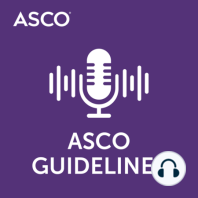7 min listen

Hepatitis B Virus Screening and Management for Patients with Cancer Prior to Therapy Provisional Clinical Opinion Update
FromASCO Guidelines
Hepatitis B Virus Screening and Management for Patients with Cancer Prior to Therapy Provisional Clinical Opinion Update
FromASCO Guidelines
ratings:
Length:
14 minutes
Released:
Jul 27, 2020
Format:
Podcast episode
Description
An interview with Dr. Jessica Hwang from MD Anderson Cancer Center and Dr. Andrew Artz from City of Hope Cancer Center on “Hepatitis B Virus Screening and Management for Patients with Cancer Prior to Therapy: ASCO Provisional Clinical Opinion Update.” This update presents a clinically pragmatic approach to HBV screening and management that calls for universal HBV serological testing of patients at the onset of anticancer therapy. Read the full PCO at www.asco.org/supportive-care-guidelines Transcript The purpose of this podcast is to educate and to inform. This is not a substitute for professional medical care and is not intended for use in the diagnosis or treatment of individual conditions. Guests on this podcast express their own opinions, experience, and conclusions. The mention of any product, service, organization, activity, or therapy should not be construed as an ASCO endorsement. Hello, and welcome to the ASCO Guidelines podcast series brought to you by the ASCO Podcast Network a collection of nine programs, covering a range of educational and scientific content and offering enriching insight into the world of cancer care. You can find all the shows including this one at podcast.asco.org. My name is Brittany Harvey. And today, I'm interviewing Dr. Jessica Hwang from the University of Texas M.D. Anderson Cancer Center in Houston, Texas, and Dr. Andrew Artz from the City of Hope Comprehensive Cancer Center in Duarte, California, co-chairs on hepatitis B screening and management for patients with cancer prior to therapy, ASCO provisional clinical opinion update. Thank you for being here, Dr. Hwang and Dr. Artz. Thank you for inviting us. Thank you so much. First, I'd like to note that ASCO takes great care in the development of its guideline products and ensuring that the ASCO conflict of interest policy is followed. The full conflict of interest information for this provisional clinical opinion panel is available online with the publication in the Journal of Clinical Oncology. Dr. Hwang, do you have any relevant disclosures that are related to this topic? Well, I have received some research funding from Gilead, a maker of a hepatitis drug in the past. And, Dr. Artz, do you have any relevant disclosures? I have no relevant disclosures. OK, then so, Dr. Artz, so this provisional clinical opinion, or PCO, on hepatitis B screening and management for patients with cancer prior to therapy was first published in 2010 and then last updated in 2015. What prompted this update to the PCO? This PCO guidance, more broadly, is necessary because the hepatitis B status for most patients is actually unknown at the time they're starting cancer therapy. In 2015, the PCO though suggested that we limit hepatitis B screening to patients who were at most risk for hepatitis B reactivation, if they were hepatitis B carriers, so those receiving anti-CD20 antibodies, such as rituximab or stem cell transplant. But for the remaining patients, most patients receiving cancer therapy, the guidance was to survey patients about their close contacts or exposures to hepatitis B and determine if formal hepatitis testing should ensue. This 2020 PCO represents an evolution in our understanding of hepatitis B screening and the dangers of hepatitis B after anticancer therapy. We've learned from studies, including those done by my colleague, Dr. Hwang, that questionnaires to detect hepatitis B are not very effective or practical. We also have accumulating information that many of our anticancer therapies pose a significant danger for hepatitis B related complications in hepatitis B infected patients. We believe appropriate monitoring and treatment, as outlined in the PCO, will reduce these dangers. So given that new information, I'd like to discuss the updated statements for the PCO. So first, Dr. Hwang, for patients who will receive systemic anticancer therapy, who should be tested for HBV and how should they be tested? That's a great question, Br
Released:
Jul 27, 2020
Format:
Podcast episode
Titles in the series (100)
Human Papillomavirus Testing in Head and Neck Carcinomas Endorsement Guideline: An interview with Dr. Carole Fakhry from Johns Hopkins School of Medicine on the ASCO endorsement of the CAP guideline on human papillomavirus (HPV) testing in head and neck carcinomas. Read the full guideline at The purpose of this podcast is to... by ASCO Guidelines